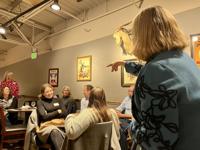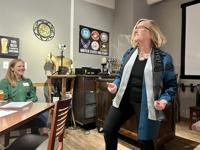Bringing ‘yes, and’ to the courtroom: Retired judge talks about her other life as an improv actor
The day Julie Field was sworn in as a trial judge in Larimer County, she began an improvisational comedy class.
“I knew I would need something outside of the court in my life that was creative and spontaneous and fun,” she recalled.
Field, who retired in 2021 as a judge on the Eighth Judicial District Court, told a group of a dozen lawyers and judges gathered at the Gilded Goat brewery in Fort Collins last week that the lessons she learned as an improv actor were directly applicable to the courtroom.
“A lot of new improvisers, especially — and new judges and new lawyers — try really hard for the big moment. They try hard for the big joke,” she said. “Improv is not about jokes. It should be very funny, but it’s not about telling jokes. It’s about the interplay between the people and the relationships and the setup and the situations people find themselves in.”
With “Whose Line Is It Anyway?” bringing improv comedy to primetime audiences and outfits like The Second City and Upright Citizens Brigade training generations of comedic actors, improv has steadily infiltrated more stoic settings. Corporate improv workshops have become popular and researchers have even written about the utility of improvisation in the legal field.
“No one law, statute, or judge comprises the whole of ‘law’ and each individual judgment is a product of ‘changing interactions’ with the collective,” wrote Sara Ramshaw, an Australian law professor. “These changing interactions are, by their very designation, at least somewhat unpredictable and improvised.”
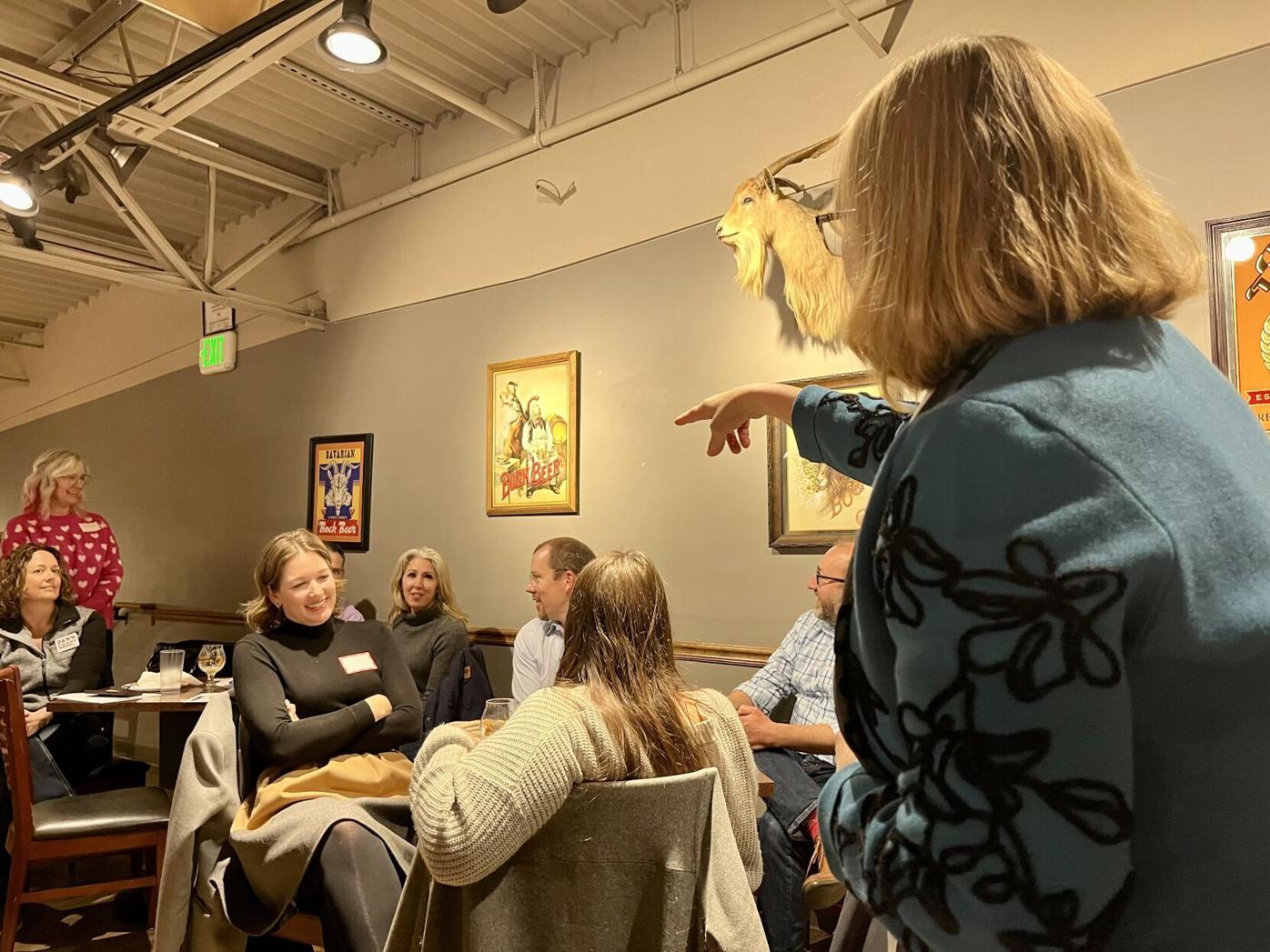
Retired District Court Judge Julie Field leads a storytelling exercise during a presentation at the Gilded Goat in Fort Collins on Feb. 15, 2024.
Michael Karlik michael.karlik@coloradopolitics.com

Retired District Court Judge Julie Field leads a storytelling exercise during a presentation at the Gilded Goat in Fort Collins on Feb. 15, 2024.
While serving as a judge, Field also belonged to an improv troupe for seven years. They performed for legal associations, nonprofits, and their friends and family — eventually disbanding because of “a divorce within our ranks,” she said.
Although Field said she applied improv skills to her judging, her day job also inspired her acting. Field recalled handling a major drug case in which a low-level dealer became a witness for the prosecution. The witness took drugs from Colorado to Montana, but forgot to get the money in exchange. Instead, he returned to Colorado with neither the drugs nor the cash.
“He’s testifying in my courtroom to this happening and he looks at me and he said, ‘I am the worst meth dealer in the world!'” Field said to laughter. “I had to agree.”
Later that night, Field had an improv show. She initiated her scene by walking out, pulling up a chair and putting her head in her hands. A fellow troupe member stepped up and asked what was wrong.
“I am the worst drug dealer in the world,” Field responded, with her scene partner transforming into her life coach to help her become a better meth dealer.
“I was not being rude or inappropriate or improper with humor in my courtroom. But I will say,” she added, “there are some times when the humor just came.”
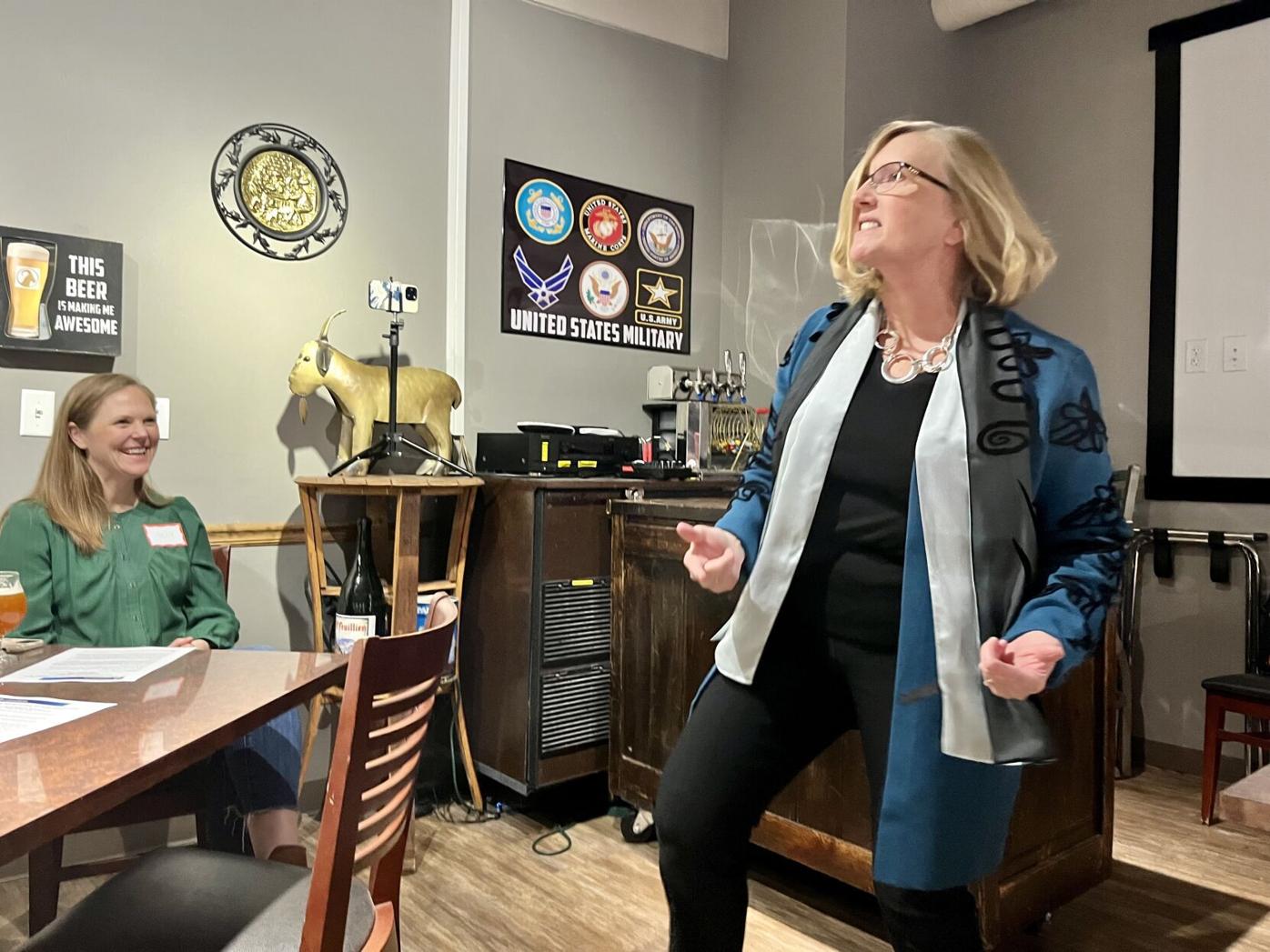
Retired District Court Judge Julie Field demonstrates an improvisational comedy exercise at the Gilded Goat in Fort Collins on Feb. 15, 2024, for her presentation about lessons lawyers can learn from improv.
Michael Karlik michael.karlik@coloradopolitics.com

Retired District Court Judge Julie Field demonstrates an improvisational comedy exercise at the Gilded Goat in Fort Collins on Feb. 15, 2024, for her presentation about lessons lawyers can learn from improv.
Field ticked through the list of improv principles: Embrace the moment. Practice makes better. Repeat for effect.
“Repeat for effect,” she said to chuckles.
She added: Trust your fellow players. Be present. Make mistakes. Move things forward by saying, “yes, and.”
“Know that if you make other people look good, you look good,” she said. “Even if you’re a judge, you’re not trying to upstage people. As a judge, you have power. You have certain power that’s given to you by the office. But it’s not about upstaging. It’s about listening, making the choices wisely.”
Then, the games began.
Field had her audience stand up and asked people to shout out an action. Everyone would respond with an enthusiastic, “Yes, let’s!” and pantomime the behavior.
“Let’s get in a jumpy castle!” Field yelled.
“Yes, let’s!” everyone repeated before jumping up and down.
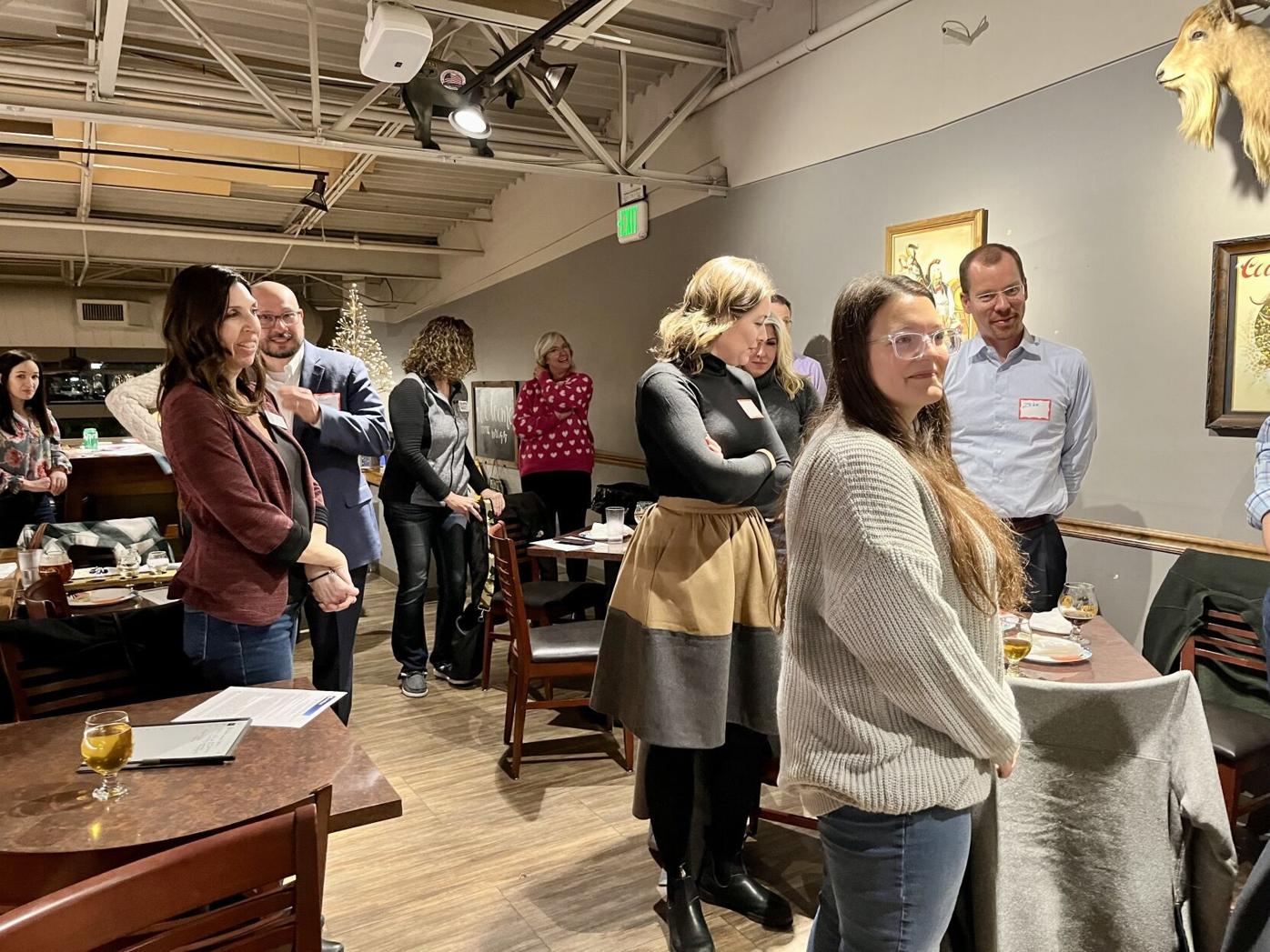
Attorneys and judges attend a presentation by retired District Court Judge Julie Field on Feb. 15, 2024 entitled " 10 Things I learned from Improv Comedy that Made Me a Better Judge (and Will Make You a Better Lawyer).”
Michael Karlik michael.karlik@coloradopolitics.com

Attorneys and judges attend a presentation by retired District Court Judge Julie Field on Feb. 15, 2024 entitled “10 Things I learned from Improv Comedy that Made Me a Better Judge (and Will Make You a Better Lawyer).”
Field then led the attorneys in a game called “One-Word Story.” She snaked around the room, with each participant speaking one word at a time.
Once. Upon. A. Blue. Glockenspiel. Dogs. Ran. Away. To. Dog. Grocery store. … Later. I. Went. To. The. Movies. And. Cried.
The lesson, said Field, is to avoid the impulse to rehearse and instead be present in the moment.
“As lawyers, as judges, we are terrible at that. We are always rehearsing what to say so we sound smart and don’t screw up,” she noted. “You may think you know the direction it’s going in improv, but someone may take it in a different direction.”
Hosted by the Colorado Women’s Bar Association, Field’s presentation drew attendees from afar — including Denver District Court Judge Adam J. Espinosa — and locally, like prosecutor Dawn Downs.
“Now, I understand what she was doing and why,” said Downs, who is currently running for district attorney. “People loved being in her courtroom. She was a great judge and a fair judge, but she connected with people. And she did it in a way that not all judges connected with people.”
Field, who is now a mediator and runs a family law consulting operation, acknowledged afterward that the adversarial nature of the American legal system may present a hurdle to fully taking advantage of some of the principles of improv. But she believed it is possible to connect, communicate and make others look good when there is trust among the actors in the courtroom.
“I think it’s easier to get people to that mindset when there are common players that repeat,” she said. “You build your reputation for being trustworthy and being somebody your opposing counsel can rely on to keep your word.”
Field added she tried to pitch the idea of an improv event during the state judges’ conferences. One time, she was allowed to lead a small workshop when a presenter canceled at the last minute. Otherwise, the Judicial Department turned her down.
“They were probably like, ‘Oh, my god, here’s Field again. She thinks she’s so funny,'” Field said.
She clarified that if the department changed its mind, she would “absolutely” give her presentation to the state’s judges.






